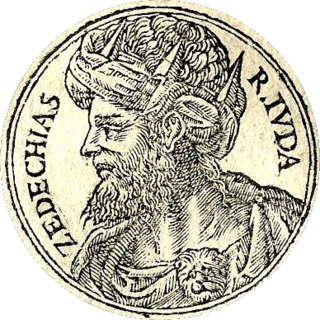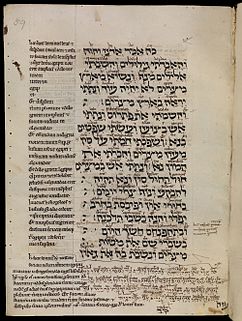
Zedekiah was the twentieth and final King of Judah before the conquest of the kingdom by Nebuchadnezzar II of Babylon. His birth name was Mattaniah/Mattanyahu.

Jeremiah 52 is the fifty-second chapter of the Book of Jeremiah in the Hebrew Bible or the Old Testament of the Christian Bible. This book contains prophecies attributed to the prophet Jeremiah, and is one of the Books of the Prophets. This chapter contains a "historical appendix", matching the account in 2 Kings 24:18–25:30 of the end of national life in Judah, and also serving as a vindication of Jeremiah's message.

Ezekiel 1 is the first chapter of the Book of Ezekiel in the Hebrew Bible or the Old Testament of the Christian Bible. This book contains prophecies attributed to the prophet/priest Ezekiel, and is one of the Books of the Prophets. In the New King James Version, this chapter is sub-titled "Ezekiel’s Vision of God", and in the New International Version, "Ezekiel’s Inaugural Vision". In the text, the first verse refers to "visions" (plural).

2 Kings 24 is the twenty-fourth chapter of the second part of the Books of Kings in the Hebrew Bible or the Second Book of Kings in the Old Testament of the Christian Bible. The book is a compilation of various annals recording the acts of the kings of Israel and Judah by a Deuteronomic compiler in the seventh century BCE, with a supplement added in the sixth century BCE. This chapter records the events during the reigns of Jehoiakim, Jehoiachin and Zedekiah, kings of Judah.

2 Chronicles 36 is the thirty-sixth chapter of the Second Book of Chronicles the Old Testament of the Christian Bible or of the second part of the Books of Chronicles in the Hebrew Bible. The book is compiled from older sources by an unknown person or group, designated by modern scholars as "the Chronicler", and had the final shape established in late fifth or fourth century BCE. This chapter belongs to the section focusing on the kingdom of Judah until its destruction by the Babylonians under Nebuchadnezzar and the beginning of restoration under Cyrus the Great of Persia. It contains the regnal accounts of the last four kings of Judah - Jehoahaz, Jehoiakim, Jehoiachin and Zedekiah - and the edict of Cyrus allowing the exiled Jews to return to Jerusalem.

Ezekiel 12 is the twelfth chapter of the Book of Ezekiel in the Hebrew Bible or the Old Testament of the Christian Bible. This book contains the prophecies attributed to the prophet/priest Ezekiel, and is one of the Books of the Prophets. In this chapter, Ezekiel undertakes the "mime of the emigrant" and the chapter concludes with condemnation of some "popular proverbs".

Jeremiah 39 is the thirty-ninth chapter of the Book of Jeremiah in the Hebrew Bible or the Old Testament of the Christian Bible. It is numbered as Jeremiah 46 in the Septuagint. This book contains prophecies attributed to the prophet Jeremiah, and is one of the Books of the Prophets. This chapter is part of a narrative section consisting of chapters 37 to 44. Chapter 39 records the fall of Jerusalem, verses 1–10, and Jeremiah's fate, verses 11–18.

2 Kings 25 is the twenty-fifth and final chapter of the second part of the Books of Kings in the Hebrew Bible or the Second Book of Kings in the Old Testament of the Christian Bible. The book is a compilation of recorded acts of the kings of Israel and Judah by a Deuteronomic compiler in the seventh century BCE; a supplement was added in the sixth century BCE. This chapter records the events during the reign of Zedekiah, the last king of Judah, the fall of Jerusalem, the governorship of Gedaliah, and the release of Jehoiachin from prison in Babylon.

Ezekiel 17 is the seventeenth chapter of the Book of Ezekiel in the Hebrew Bible or the Old Testament of the Christian Bible. This book contains the prophecies attributed to the prophet/priest Ezekiel, and is one of the Books of the Prophets. This chapter tells, and then interprets, the riddle of the great eagle. The original text of this chapter is written in the Hebrew language. This chapter is divided into 24 verses.

Jeremiah 22 is the twenty-second chapter of the Book of Jeremiah in the Hebrew Bible or the Old Testament of the Christian Bible. This book contains prophecies attributed to the prophet Jeremiah, and is one of the Books of the Prophets.

Ezekiel 21 is the twenty-first chapter of the Book of Ezekiel in the Hebrew Bible or the Old Testament of the Christian Bible. This book contains the prophecies attributed to the prophet/priest Ezekiel, and is one of the Books of the Prophets. In chapters 20 to 24 there are "further predictions regarding the fall of Jerusalem", and this chapter also includes a prophecy against the Ammonites.

Ezekiel 24 is the twenty-fourth chapter of the Book of Ezekiel in the Hebrew Bible or the Old Testament of the Christian Bible. This book is attributed to the prophet/priest Ezekiel, and is one of the Books of the Prophets. This chapter contains Ezekiel's "last oracle against Jerusalem".

Ezekiel 27 is the twenty-seventh chapter of the Book of Ezekiel in the Hebrew Bible or the Old Testament of the Christian Bible. This book contains the prophecies attributed to the prophet/priest Ezekiel, and is one of the Books of the Prophets. This chapter contains a lamentation for the fallen city of Tyre.

Ezekiel 30 is the thirtieth chapter of the Book of Ezekiel in the Hebrew Bible or the Old Testament of the Christian Bible. This book contains the prophecies attributed to the prophet/priest Ezekiel, and is one of the Books of the Prophets. Biblical commentator Susan Galambush observes that Chapters 29–32 contain seven oracles against Egypt, balancing the seven oracles against Israel's smaller neighbors in chapters 25–28. Andrew Davidson divides this chapter into two prophecies, "the first of which, verses 1-19, in all probability belongs to the same date as Ezekiel 29:1–16, that is, about seven months before the fall of Jerusalem; and the second, verses 20-26, is dated four months before the capture of the city".

Ezekiel 32 is the thirty-second chapter of the Book of Ezekiel in the Hebrew Bible or the Old Testament of the Christian Bible. This book contains the prophecies attributed to the prophet/priest Ezekiel, and is one of the Books of the Prophets. This chapter contains two revelations from God regarding Egypt and its Pharaoh, concluding Ezekiel's prophecies against Egypt.

Ezekiel 35 is the thirty-fifth chapter of the Book of Ezekiel in the Hebrew Bible or the Old Testament of the Christian Bible. This book contains the prophecies attributed to the prophet/priest Ezekiel, and is one of the Books of the Prophets. This chapter contains a prophecy against Mount Seir in Edom, to the south of Judah. Biblical commentator Susan Galambush pairs it with an oracle promising "restoration to the mountains of Israel" in the following chapter.

Jeremiah 28 is the twenty-eighth chapter of the Book of Jeremiah in the Hebrew Bible or the Old Testament of the Christian Bible. The material found in Jeremiah 28 of the Hebrew Bible appears in Jeremiah 35 in the Septuagint. This book contains prophecies attributed to the prophet Jeremiah, and is one of the Books of the Prophets. This chapter contains a confrontation between prophets Jeremiah and Hananiah: Hananiah's false prophecy is responded by Jeremiah's answer, Jeremiah 28:1-9. Hananiah breaks Jeremiah's yoke, Jeremiah foretells an iron yoke, and Hananiah's death, Jeremiah 28:10-17.

Jeremiah 34 is the thirty-fourth chapter of the Book of Jeremiah in the Hebrew Bible or the Old Testament of the Christian Bible. It is numbered as Jeremiah 41 in the Septuagint. This book contains prophecies attributed to the prophet Jeremiah, and is one of the Books of the Prophets. This chapter anticipates the final moments in the assault of the Babylonian army against Jerusalem, when Jeremiah foretold the destruction of the city and the captivity of King Zedekiah, and sharply criticized the treacherous dealings of the princes and people with the slaves that provoked the punishment from God.

Jeremiah 35 is the thirty-fifth chapter of the Book of Jeremiah in the Hebrew Bible or the Old Testament of the Christian Bible. It is numbered as Jeremiah 42 in the Septuagint. This book contains prophecies attributed to the prophet Jeremiah, and is one of the Books of the Prophets. This chapter records the meeting of Jeremiah with the Rechabites, a nomadic clan, in which the prophet "contrast[s] their faithfulness to the commands of a dead ancestor with the faithlessness of the people of Judah to the commands of a living God".

Jeremiah 37 is the thirty-seventh chapter of the Book of Jeremiah in the Hebrew Bible or the Old Testament of the Christian Bible. It is numbered as Jeremiah 44 in the Septuagint. This book contains prophecies attributed to the prophet Jeremiah, and is one of the Books of the Prophets. This chapter is the start of a narrative section consisting of chapters 37 to 44. Chapter 37 records King Zedekiah's request for prayer, Jeremiah's reply to the king, and Jeremiah's arrest and imprisonment.







